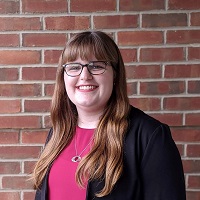Position: PhD Candidate
Current Institution: Johns Hopkins University
Abstract: Coherence-based Learning from Raw Ultrasound Data for Breast Mass Diagnosis
Breast cancer is the most prevalent cancer among women in the United States with approximately one in eight women being diagnosed in their lifetimes. Imaging modalities such as mammography MRI and ultrasound are employed to non-invasively visualize breast masses in order to determine the need for a biopsy. However each of these methods results in a significant number of patients requiring biopsies of benign masses. Ultrasound in particular is praised for its low cost painlessness and portability yet the false positive rate of breast ultrasound can be as high as 93% depending on the type of mass in question. When an ultrasound image is formed through a process called beamforming the received ultrasound waves are reduced to a single grayscale image which is typically used for diagnosis. While this approach has been successful information is lost during the B-mode image formation process. An alternative approach to the lossy process of information extraction from B-mode images is to leverage features (e.g. spatial coherence) of backscattered ultrasound waves to determine the content of a breast mass. My work focuses on improving the diagnostic quality of breast ultrasound images by leveraging this spatial coherence information. Furthermore one remaining challenge is that spatial coherence information is time-consuming to compute. Therefore to overcome limitations with real-time implementation of coherence-based imaging techniques I deployed a novel deep learning architecture which improves the computational speed and directly learns physics-based features from raw ultrasound data resulting in a diagnostic tool that has the potential to reduce unnecessary biopsies and better allocate resources in the healthcare system.
Bio:
Alycen Wiacek is a PhD Candidate at Johns Hopkins University in the Photoacoustic and Ultrasonic Systems Engineering (PULSE) Lab. She received her B.S. in Electrical Engineering from Wayne State University in 2014 her M.S. in Electrical and Computer Engineering from Oakland University in 2015 and her M.S.E. in Electrical and Computer Engineering from Johns Hopkins University in 2019. She is an Achievement Rewards for College Scientists (ARCS) Scholar and received the Johns Hopkins Whiting School of Engineering Excellence in Research Trainee Award in 2018. Her research lies at the intersections of biomedical signal processing machine learning and radiology: leveraging advanced signal processing techniques to develop ultrasound and photoacoustic imaging systems for women’s health applications that improve patient care reduce surgical complications and improve healthcare resource allocation. She is also a passionate teacher and mentor striving to inspire other women and minorities to pursue STEM.
